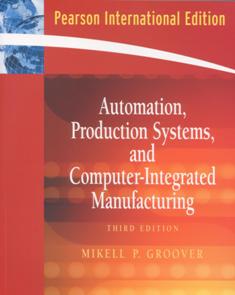書籍分類

Automation, Production Systems, and Computer-Integrated Manufacturing 3/e
作者:Mikell P. Groover
原價:NT$ 1,200
ISBN:9780132070737
版次:3
年份:2008
出版商:Pearson Education
頁數/規格:831頁/平裝單色
版次:3
年份:2008
出版商:Pearson Education
頁數/規格:831頁/平裝單色
內容介紹 本書特色 目錄 作者介紹
- Description
This exploration of the technical and engineering aspects of automated production systems provides the most advanced, comprehensive, and balanced coverage of the subject of any text on the market. It covers all the major cutting-edge technologies of production automation and material handling, and how these technologies are used to construct modern manufacturing systems.


